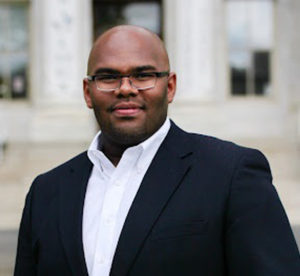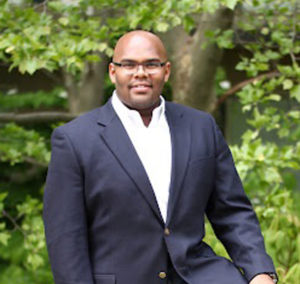Late in 2015, I was approached with an opportunity to conduct an interview with Hill Harper regarding his collaboration with the National Honor Society and its Honor Your Future Now campaign. Of all of my submissions for the Examiner, this felt like my biggest one yet. In addition to getting the word out about Honor Your Future Now, Hill and the National Honor Society’s goal was to get parents and young people thinking early about the steps they could take towards preparing for college. He also shared some important aspects of his own journey through life. This interview was previously published on the both The Examiner and The Edvocate.
* * *
With roles in a long list of films including: Get on the Bus, Beloved, He Got Game, The Skulls, For Colored Girls, and most recently, Concussion, Hill Harper needs no introduction. Also an education advocate, the actor/author recently gave an interview on Jan. 12 in collaboration with the National Honor Society regarding its Honor Your Future Now Campaign. In the following interview, Hill discusses the campaign, in addition to other keys to success for students and parents in the areas of college and career planning, and life.
Anwar Dunbar: First off Hill, I’m a longtime fan of your work and appreciate this opportunity to interview you. You are a very well accomplished actor, writer, and an education advocate. Were you always a straight A student yourself? If not, what was the turning point for you?
Hill Harper: No I wasn’t, though my parents very much emphasized the value education can play in your life. In high school I don’t think the teachers or my peers necessarily expected me to be great or do well. I was just an okay student. But there was a fire lit within me, because it was explained to me that there was a link between how I performed in school and my future opportunities.
That’s really the key because when we tell kids to stay in school, we usually just stop there. We usually don’t tell them why, and someone had the foresight to pull me to the side and say, “Hey, you don’t just have to be on the same level as everybody else. If you apply yourself, you can excel, and if you do excel, this is what can happen.”
Because of this I was one of the first people from my school to go away to and graduate from an Ivy League institution (Brown and Harvard Universities). Again, the reason this happened was because I was fortunate enough to have someone pull me to the side and say, “Hey, what you do in school now will impact your future options, so apply yourself,” and that’s why I’m so proud of the National Honor Society pillars; because when you think about what they represent, you can see that you can really build a life of a well-rounded student and individual. That’s what I aspired to do, and that’s ultimately what I became.
AD: I see that you’re from Iowa and have two very accomplished parents. Did you have any challenges as a youth on your journey through school and to all of your successes?
HH: What’s interesting for me is that we left Iowa when I was just starting first grade, very early. I came back for just a little bit, one year of eighth grade, but for the most part I was educated somewhere else. As an African American and moving through different schools and around a lot, maybe that’s why I became an actor because you have to get comfortable meeting new people and adapting to new situations. Certainly in Iowa, African Americans are not the majority, but my parents always made it very clear not to focus on race, and race-based thinking in terms of my education, and in terms of whatever preconceived notions some people may have had.
I can’t speak for how the teachers may have perceived me, but I can say that I was never going to allow anyone to think that I couldn’t perform on the same level as them based on anything having to do with race, and any kinds of stereotypes around education and educational performance. I’m proud of being from the Midwest and having Midwestern roots because it really seems the Midwest is a place where old school values are.
I’m also proud that I went to high school in California because that opened me up to different types of diversity that I wouldn’t have experienced otherwise. So I kind of got the best of both worlds growing up, certainly by having two parents who were educated. Both of my parents met at medical school at Howard University. I’m very proud that I was able to follow in their footsteps to go to college and graduate school.
AD: That’s interesting because for some black males even when they come from “successful” homes, they’re still caught between following that path or following the negative images in the media, you know, the “street credibility” type of thing.
HH: Exactly. That does happen. In part, to me that happens because many of those young men don’t have enough positive male role models to emulate, which is why it’s important for me to be visible and vocal about my education. A lot of young men will send letters, emails, tweets, or posts on Instagram saying, “Hey man, people used to tell me that it wasn’t cool to be smart and now knowing you, I realize that it’s cool to be smart, because you’re a cool guy. It’s sexy to be smart.”
Smart is the new cool, so I think we can turn the corner on that, particularly with campaigns like Honor Your Future Now, which is a cool campaign. It’s about honoring your future, but it starts right now and to me, if we can get that message out to young people and young African American men, we can really have impact because oftentimes a lot of these young men are taught not to think about their future. They’re taught to think about right now only, and that leads to poor sets of choices. Ultimately in life, we’re all the aggregation and accumulation of a series of choices that we make, and those choices determine our life’s path.
AD: Tell me about the Honor Your Future Now campaign, and why you decided to get involved?
HH: I eagerly came together with the National Honor Society and National Junior Honor Society to help with this campaign. It’s really a call to action for students titled Honor Your Future Now. They’re providing resources, they’re providing advice to prepare for college and careers, and hopefully lifetime success. I got involved because I was a member of the National Honor Society when I was in school, and they reached out to see if it was something I would help them talk about.
There are five pillars of the National Honor Society:
• Scholarship- Performing well in school, doing your best and preparing for college;
• Character- This one is huge for me and actually goes back to what we just talked about: making choices in your life which are character based choices, demonstrating high standards of honesty and integrity, courtesy and being a high character person;
• Leadership- Stepping up and embracing the fact that as a young person, saying I can make a difference in my school, in my family’s life and in my own life;
• Citizenship- Being a good steward and a good citizen, understanding what your rights are in this country, understanding that you are just as in control of your community as anyone else and;
• Service- Volunteering in community service projects and getting involved.
So if you think about it, these all create a well-rounded person, and I love touting those pillars and those ideals, and they really underlie a lot of what I believe.
Right now we want to talk about how to pay for college. If you go online to Honor Your Future Now, there are lots of resources. There are a lot of misnomers that students walk around with. I talk with students all over the country and they’ll tell me, “Yeah, I want to go to college, but I can’t afford it.” The simple fact is they can’t afford not to go school, and there are different ways to pay for college. The National Honor Society has a college funding graphic on the site. It’s like an infographic and there’s also a link for the Free Application for Federal Student Loans which is a link to the government student loans.
Often these students are coming from schools where their college counselors aren’t up to speed on all of this information about how to pay for school. You have: scholarships, grants, work study programs, and loans, so many different ways to pay for school. Students have to understand that you may have to combine these things, and it’s not just going to be one thing fixes all.
It’s not necessarily going to be a full ride scholarship, and it’s not that you’ll necessarily have to take out loans for the whole thing. You’re going to go and learn about all of the things that are offered and then cobble together how to pay for your education. You’ll get a little scholarship money here. You’ll get a grant here, and some work study there. You’ll get a federal loan as well, and doing all of this, you’ll be able to cobble together the money to pay for school.
AD: In addition to the rising costs of school leading to exorbitant amounts of student debt, what other challenges do you see today’s college students facing? In general, are there qualities and values that you see today’s students (i.e. the millennials) missing that were more prevalent when you were in college?
HH: I think being a critical thinker, and an innovator, are some of the things that will help you get ahead. At the same time understanding technology and really digging in, in terms of science, technology, engineering and mathematics (STEM) will really help. I hear so many students say, “I’m no good at math, and I’m no good at science.” When someone says that to me, they’re really expressing a fear more so than the truth because it’s all relative.
It’s not about being good. You have a proficiency in something to a certain degree that other people may not have. Proficiencies aren’t good or bad. It’s just where you are at that particular time, and you can improve those skill sets. If students have these blocks saying, “I’m no good at this, I’m no good at that”, they’ll block it out and it becomes a self-fulfilling prophecy that their proficiency level won’t rise. So the biggest thing to me is conquering the students’ fears. There’s a lot of fear about future jobs and job growth. There’s a lot of fear about technology, engineering and math and science, and there’s a lot of fear about where we’re headed.
Here’s the deal, an educated person who is a critical thinker, who is educated and a good communicator, and actually embodies the five pillars of the National Honor Society is someone who will be able to work in the future, be gainfully employed, and by the way, happy with their career choice. The person who allows fear to stop them from pursuing their higher education, to stop them from even going onto the Honor Your Future Now, and the National Honor Society websites, that’s what I’m most concerned about and that’s what a lot of people do.
AD: Okay Hill, I have one last question. Do you have any closing words or advice for students or parents who may read this interview?
HH: Absolutely. Think boldly and creatively about your future. Think globally and not locally. So many students I talk to think that they have to stay within their relatively small geographic circle, and that they can in no way afford to go anywhere else. And again, that’s misinformation. Fear for me stands for: False Evidence Appearing Real. So much false information is passed down amongst students, teachers, and parents.
The number one place that the students go to for advice around paying for college is their parents. So if parents are actually reading this article, I need parents to go to the National Honor Society and Honor Your Future Now websites, and look at what’s there, because you are going to be the most instrumental person giving your student advice, and if you don’t have the right information, they’re going to get misinformation, so don’t be afraid of what’s out there. Don’t be afraid to learn as much as possible and don’t be afraid to apply to as many different types of scholarships, grant programs, and other loan opportunities to find the best place for your student to go.
And if you’re a parent, don’t be afraid to let your student go away. I’ve heard many parents say, “Well they aren’t ready to go out of state. They’re not ready to go there.” Don’t let your fears hold back the opportunities for your student.
I have a quick story of a young man who was from Mississippi who had the opportunity to go to Alaska to get some higher education and some vocational training. His parents initially didn’t want him to go but he went, and his whole life and world have changed. He has all of these different job offers at this point in different fields in energy and oil production.
These are opportunities that have been given to him, where he is going to become two to three times the highest earner in the history of his family, and that’s coming right out of school. That’s because he looked for opportunities that were further away from where he was where the opportunities didn’t exist, but they figured out how to make it work. So those types of things do exist. It’s just a matter of the individual and the parents of the students doing the work and not being afraid to take a risk.
AD: Okay Hill, those are all of my questions. Thank you again for this interview. Your messages about the National Honor Society and Honor Your Future Now will really benefit a lot of students and families.
HH: Thank you, Anwar.
To learn more about the resources for college planning discussed by Hill Harper in this interview, visit the National Honor Society, and Honor Your Future Now.
Thank you for taking the time out to read this interview. If you enjoyed this post you may also enjoy:
• Dr. Jonathan Mathis discusses Honor Your Future Now Campaign
• JetBlue discusses initial findings form book vending machine program part two
• JetBlue discusses initial findings from book vending machine program part one
• Challenging misconceptions and stereotypes in class, household income, wealth and privilege
• Challenging misconceptions and stereotypes in academic achievement
• The benefits and challenges of using articulate speech
The Big Words LLC Newsletter
For the next phase of my writing journey, I’m starting a monthly newsletter for my writing and video content creation company, the Big Words LLC. In it, I plan to share inspirational words, pieces from this blog and my first blog, and select videos from my four YouTube channels. Finally, I will share updates for my book project The Engineers: A Western New York Basketball Story. Your personal information and privacy will be protected. Click this link and register using the sign-up button at the bottom of the announcement. If there is some issue signing up using the link provided, you can also email me at bwllcnl@gmail.com . Best Regards.










 Late in 2015, I was approached with an opportunity to conduct an interview with
Late in 2015, I was approached with an opportunity to conduct an interview with  JM: You know, to make a long story short, I always used to play school as kid so I’ve always loved what school looked like. Professionally, I began my career working in college admissions, and then I served in a post-secondary institution, and then in a secondary school. I served as the director of college counseling for a charter school, and I also served as an admissions counselor and a multicultural recruiter. I spent a lot of time doing induction programs for new students. I completed a Ph.D. in Urban Education Policy with a focus on this conversation we’re having around access and success for students, so my career has been and will continue to be around getting students to and through college. It’s what I’m most passionate about, and you know, playing school as a kid and growing up on colleges campuses, I know few other places as well as I know colleges and high schools, so it’s truly a pleasure to serve in this capacity. But it’s been my career and it will continue to be; helping students actualize their dreams.
JM: You know, to make a long story short, I always used to play school as kid so I’ve always loved what school looked like. Professionally, I began my career working in college admissions, and then I served in a post-secondary institution, and then in a secondary school. I served as the director of college counseling for a charter school, and I also served as an admissions counselor and a multicultural recruiter. I spent a lot of time doing induction programs for new students. I completed a Ph.D. in Urban Education Policy with a focus on this conversation we’re having around access and success for students, so my career has been and will continue to be around getting students to and through college. It’s what I’m most passionate about, and you know, playing school as a kid and growing up on colleges campuses, I know few other places as well as I know colleges and high schools, so it’s truly a pleasure to serve in this capacity. But it’s been my career and it will continue to be; helping students actualize their dreams.